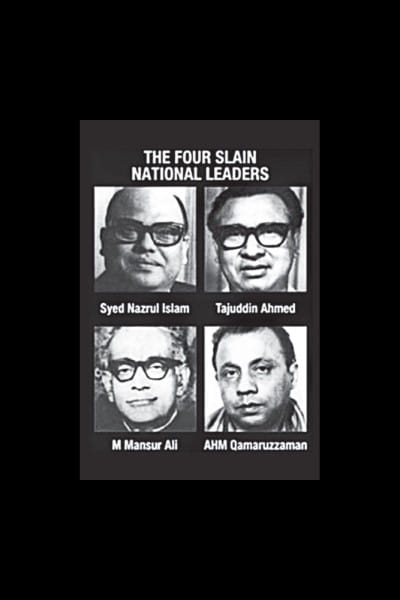Bangladesh's Day of Infamy

November 3, 1975. At around 4 am some soldiers with full combat postures demanded entrance into Dhaka Central Jail. Seeing the armed men, the baffled jail officials, called the then Deputy Inspector General of Prisons (DIG, Prison) Abdul Awal. Abdul became horrified when he came to know about the demand of the soldiers. They demanded the four national leaders; Syed Nazrul Islam, Tajuddin Ahmed, Captain Mansur Ali and A H M Quamruzzaman be handed over to them. However, Abdul refused their demand as it was against prison regulations, but the soldiers insisted. After some heated conversations, the DIG phoned Bangabhaban to get clarification directly from the then President Khandaker Mushtaq Ahmed and received the fateful permission.
The soldiers went straight to the cells where the four national leaders were kept interned after the assassination of Bangabandhu. Instead of taking the leaders out, they gathered them in a congested cell and fired their machineguns at them from point blank range. The eyes that once dreamed of an independent, free Bangladesh were shut by the very men who killed Sheikh Mujibur Rahman, the liberator of Bangladesh, a few months ago. This savage, dastardly killing of Bangladesh's national leaders changed the course of the country's fate forever.
From the very beginning of Bangladesh's movement for self determination, these four leaders had been playing a vital role in organising the political uprising against Pakistani rulers. When the liberation war broke out, these leaders, escaping the onslaught of Pakistan army, managed to form the Bangladesh government in exile which is popularly known as Mujibnagar government and led the nation in absence of Bangabandhu throughout the liberation war.
It was Syed Nazrul Islam under whose leadership the Mujibnagar government was formed in April 17, 1971 and he fulfilled his duty to the nation as the acting President of the government during the liberation war. After the liberation, he held many significant positions in the government to reform the nation such as Ministry of Industry, the deputy leader of the parliament and a member of the constitution committee. He was also one of the key organisers of Bangabandhu's new political party called Bangladesh Krishak Sramik Awami League (BAKSAL).
Tajuddin Ahmad was one of the closest associates of Bangabandhu and was the General Secretary of Awami League during the fiery years of 1960s and early 1970s. He was one of the key coordinators of Bangabandhu's election campaign in 1970 where Awami League won the historic majority in Pakistan's parliament. In 1966 he was arrested and imprisoned by the Pakistan army for his role in designing the six points. After the crackdown in March 25, 1971, Tajuddin managed to go to India and took the historic responsibility of the first Prime Minister of Bangladesh government. After the liberation, Tajuddin became the minister of finance and planning.
However, in 1974 due to internal feud in Awami League, he lost his cabinet post but he remained loyal to Bangabandhu till the very end.
Captain Mansur Ali was also one of the key organisers of Bangladesh liberation war. He was the finance and planning minister of Mujibnagar government and held many important ministries after the liberation of the country. In 1975 he became the Prime Minister of Bangladesh. He was also the general secretary of BAKSAL and one of the key organisers of Jatiyo Rakkhi Bahini, a militia formed by Bangabandhu himself.
A H M Quamruzzaman was a senior leader of Awami League and contributed significantly during the liberation war as the minister of relief and rehabilitation of the Mujibnagar government. He elected three times as the member of national assembly consecutively in 1962, 1965 and 1970. He was also an executive member of BAKSAL.
Therefore, after the assassination of Bangabandhu and his family members, the rebellious army officers and the usurper Khandaker Mushtaq Ahmed soon identified these leaders as their potential threats. At that time, Bangladesh's politico-military situation was very volatile. Bangabhaban was occupied by the rebellious junior army officers and the then President was nothing but a puppet in their hands. Discipline in the armed forces was shattered and possibility of a counter coup led by Major General Khaled Mosharraf to overthrow Khandaker Mushtaq Ahmed was growing stronger and stronger. In this situation, the renegade officers and political leaders apprehended that any of these four national leaders could easily challenge their heinous acts and took control of the restive government.
Considering the threat and under the cover of this severe unrest, they arrested all the four leaders on August 22, 1975 and imprisoned them in Dhaka Central Jail. Then after months of negotiations with the army officers and political leaders, the key organisers of Bangabandhu's assassination managed to get indemnity and a safe exit to Bangkok. Just on the eve of their departure, the four national leaders were brutally killed and the legacy of Bangabandhu's government was erased permanently.
November 3, this day of infamy made way for decades long undemocratic military dictators in Bangladesh. Bangladesh's secular and socialist constitution was changed several times, all the political parties were restored and with growing discontent against the dictatorial rule, Bangladesh entered into an eternal phase of political instability.
In 2009, a few of the plotters of the infamous jail killing were executed in 2009 for their involvement in the assassination of Bangabandhu and his family members. However, the government has failed to bring the main perpetrators of the jail killing to justice. November 3 is the day when Bangladesh had lost the leaders who could lead the country with solidarity towards progress. Intense leadership crisis in Bangladesh, ideological confusion, and politics of corruption and self interest remind us of the fact that still Bangladesh could not recover from the loss of these great leaders.

 For all latest news, follow The Daily Star's Google News channel.
For all latest news, follow The Daily Star's Google News channel. 



Comments